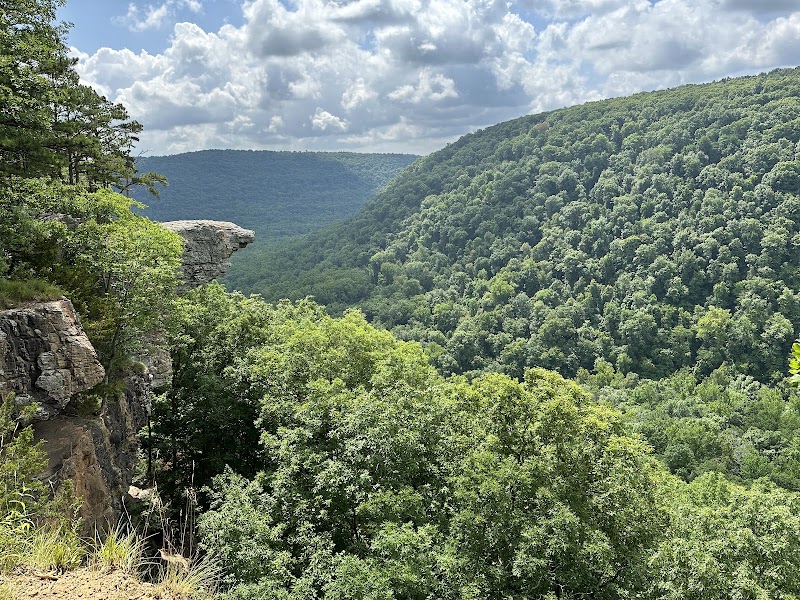Mastering Campground Etiquette and Safety in Secluded Arkansas Wilderness
Discover how to navigate campground etiquette and safety while exploring Arkansas's secluded wilderness. This guide balances practical safety tips with the thrill of camping in some of the state's most remote forests, ensuring your adventure is both rewarding and responsible.
Stick to Designated Campsites
Preserve the fragile Arkansas ecosystem by camping only in established areas to minimize impact on soil and vegetation.
Carry Water Purification Tools
Natural water sources can harbor bacteria; always filter or treat water before drinking to avoid illness.
Keep Fires Controlled and Minimal
Use existing fire rings or portable stoves only, and never leave fires unattended, especially during dry months.
Respect Quiet Hours
Maintain low noise levels from dusk to dawn to preserve the peace for wildlife and other campers.
Mastering Campground Etiquette and Safety in Secluded Arkansas Wilderness

RV Site #15 (30 amp site)
Starting at $45 for a 30 amp RV Hookup for up to Two People.
Experience the thrill of white-water rafting on the Ocoee River with Adventures Unlimited. Combine this high-energy adventure with a relaxing stay at private RV site #15 for an unforgettable outdoor getaway.
Arkansas’s remote campgrounds offer a rare kind of solitude where the forest breathes around you and the night sky dares to outshine the city’s glow. But with that calm comes responsibility. Navigating campground etiquette and safety in these secluded settings demands respect for both nature and fellow adventurers.
Start with the basics: choose your campsite thoughtfully. In Arkansas’s deep woodlands, spots may feel limitless, but stick to established areas to protect fragile soil and plant life. Keep your fire contained—use existing fire rings or portable stoves—and never leave a flame unattended. The woods here are fiercely dry come late summer, and sparks can quickly turn into wildfires eager to rewrite the landscape.
Hydration is your foundation. Streams and springs often wind through the forest, daring you to stop, but untreated water is unreliable company. Bring a water filter or purification tablets; your body will thank you after climbing over rugged terrain where the trail can rise 800 feet in under two miles. Footwear must be sturdy—waterproof hiking boots with good tread will keep the relentless underbrush and wet ground from slowing your pace.
Respect quiet hours and camp boundaries. Secluded doesn’t mean silent, but it does mean shared solitude. Keep voices low, music off, and gear organized to ensure everyone feels comfortable. Dispose of waste properly: pack it out, or use provided facilities. Human scent and trash invite animals—to your campsite or their habitat to your detriment.
Weather in Arkansas can shift abruptly. Summer heat presses hard in the afternoon; plan hikes for early morning or late afternoon, when the forest’s cooler shades stretch and invite exploration. Fall paints the hills in flame-colored leaves but beware slick, damp rocks and unpredictable chills once the sun dips. In every season, pay attention to poison ivy—the plant shows no mercy and grows thick underfoot.
Finally, prepare for emergencies. Cell service is spotty, so carry a map, compass, and a fully charged power bank for your devices. Know the nearest ranger station in towns like Jasper or Ponca, where help is more than a hopeful thought.
The wild here is fiercely itself: raw, vibrant, and exacting. Your adventure in Arkansas’s secluded campgrounds won’t just test your gear or endurance—it will engage your awareness, patience, and respect for a force that both challenges and rewards with every step. Step carefully, act deliberately, and the forest will unfold as your steadfast companion through every dusk and dawn.
Nearby Trips
All Adventures
Boat Charters
Water Activities
Adventures near Jasper
Discover the unique and memorable adventures that make Jasper special.
Frequently Asked Questions
What is the best way to handle food storage in remote Arkansas campgrounds?
Use bear-proof containers or hang food in a tree away from camp to avoid attracting wildlife. Arkansas’s black bears are curious and persistent, so securing food protects both you and the animals.
Are permits required for camping in remote areas of Arkansas?
Many designated campgrounds in national forests require permits, but dispersed camping outside of developed sites often does not. Check local forest service regulations to be sure.
What should I do if I encounter wildlife while camping?
Keep your distance and never feed animals. Make noise while hiking to alert wildlife of your presence. If approached, back away slowly and avoid sudden movements.
How do I minimize environmental impact while camping in secluded Arkansas forests?
Follow Leave No Trace principles: camp on durable surfaces, pack out all trash, minimize campfire size, and avoid disturbing natural features.
What’s a lesser-known viewpoint in this region worth visiting?
The overlook at Hawksbill Crag offers striking views with fewer visitors late in the day. It rewards hikers with a sweeping panorama of the Boston Mountains.
Are there specific plants or insects to be cautious about in Arkansas woods?
Poison ivy grows thick and blends into the forest floor—learn its leaf patterns. Ticks carrying Lyme disease are present; use repellents and check yourself regularly.
Recommended Gear
Water Filter or Purification Tablets
Ensures safe drinking water from natural sources throughout your trip.
Sturdy Waterproof Hiking Boots
Protect your feet on uneven, wet terrain and provide ankle support for elevation changes.
Portable Stove or Campfire Ring
Allows safe cooking while minimizing wildfire risk in dry conditions.
Insect Repellent
Vital in warmer months to protect against mosquitoes and ticks.
Local Insights
Hidden Gems
- "Hawksbill Crag overlook for panoramic ridgeline views"
- "Small cave near Buffalo River with natural rock formations"
- "Quiet side trails leading to the White River’s edge"
Wildlife
- "Black bears roaming with cautious curiosity"
- "White-tailed deer often appearing at dawn and dusk"
- "Songbirds that dominate the forest soundtrack despite human absence"
History
"The region holds remnants of early logging camps and Cherokee heritage sites, revealing a past that layered its wilderness with human stories."
